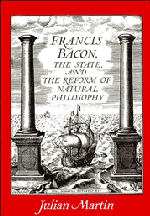Summary
This study attempts to provide a historical explanation of the origin and nature of the natural philosophy of Francis Bacon. It is not a critical assessment of the worth of his proposals, in the manner characteristic of philosophers of science, nor is it concerned to situate Bacon with respect to one or more traditions of philosophy in the Renaissance – a venerable strategy in the historiography of ideas, which implies location itself to be much the same as explanation. It is, instead, rigorously local in its attentions. Its premise is that the origin and nature of Bacon's natural philosophy can be explained satisfactorily only with careful attention to his context. In jure non remota causa, sed proxima spectatur, Bacon remarked of the law, and the maxim is useful in historical practice, too. This study looks to the concrete and the proximate, and necessarily begins with a strong biographical element.
‘He was a great reader of books’, Bacon's chaplain recalled, ‘yet he had not his knowledge from books alone, but from some grounds and notions within himself.’ A truly satisfying historical explanation of Francis Bacon's natural philosophy must include an answer to why and how it was that Bacon became involved in writing natural philosophy. Only by seeking out these ‘grounds and notions’ can we fully appreciate why he wrote it in the particular (and peculiar) manner in which he did.
- Type
- Chapter
- Information
- Publisher: Cambridge University PressPrint publication year: 1991



